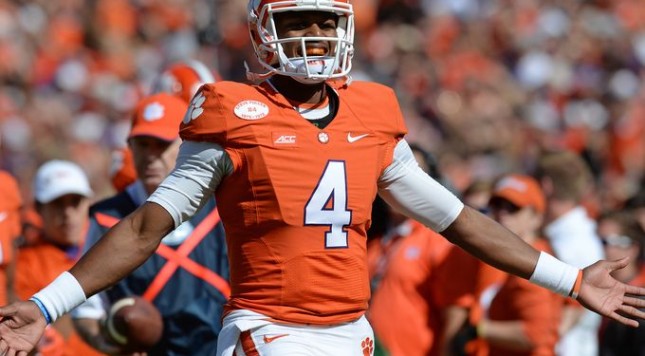The Heisman Trophy has become something of a Halloween costume.
It’s supposed to be given to the “best player in college football,” and then it has this odd integrity clause which is ambiguous enough to suggest that voting members are free to get their Twitter psychology degrees and opine as to whether or not someone is fit for the award.
We already know that alleged crimes against NCAA eligibility will be retroactively punished. Personally, I swear I still saw Reggie Bush win the thing. We’re not sure if that means that it’s just an NCAA thing, or if generally being a bad human being would disqualify someone from earning the award.
When you’re young and you get into writing about or covering college football, you get this idea that the most recognizable individual trophy in sports really can be about “the best player in the sport,” so you support offensive linemen, linebackers, whoever might actually be the best player in your mind. You soon realize it’s like telling people that some underground punk band you found on Napster really deserves a Grammy. One or two people will listen. The rest will wait for you to get old and realize you can’t change the system.
What it really is, is “the best skill position player in the country, 70 percent weighted to the quarterback, 20 percent to the running back, 9 percent to the wide receiver, and 1 percent to Charles Woodson. Oh, and the caveat these days is that it has to be someone competing for a championship.”
In rare cases, like this year, the guy who’s the best individual player in college football also doubles as what would pass for an “MVP candidate” and then in some sort of logical utopia, leads his team into championship waters. This is one of those years when you don’t vote for Khalil Mack of Buffalo as though he’s the football equivalent of presidential candidate Gary Johnson in 2012; in a year like this, you don’t vote for someone just because you’d rather toss your vote away and “stick it to the system” in your own mind, which is somehow more true to yourself.
The guy this year is Deshaun Watson, who likely won’t win it, but should in a runaway.
It’s important to remember: Watson has lost only one game he’s started and finished, last season against Florida State on the road in overtime, when the Tigers had the game salted away if not for a fumble late in the game in FSU territory.
However, wins and losses aren’t all of it. This season, he has 30 touchdowns to 11 interceptions. In the three biggest games this season for Clemson, judged by how close the Tigers were to actually losing, he threw for 11 touchdowns and two interceptions. That doesn’t include the three rushing scores he had against a South Carolina team in a rivalry game playing with everything it had.
It’s not meant to slight the other candidates. Watson is distancing himself from a very worthy field. Alabama probably has two more losses without running back Derrick Henry. The same could be said for Stanford with Christian McCaffrey. Perhaps more could be said for Navy quarterback Keenan Reynolds.
The other caveat to this all is that Watson has done it with a significant amount of departed talent on both sides, especially the defensive side of the ball, one that was arguably the best in the nation last season. The Tigers returned only three starters, so this offense had to lead the team to get to the playoffs at the very least.
Since giving up over 25 points all of zero times through Halloween, the Tiger defense has done it four times since, including an undressing by North Carolina State for 41 that saw Watson throw five touchdown passes en route to a road win.
Watson appears to fit the integrity clause, too, because no ex-girlfriends are trolling him on Twitter, and there have been no reports of him swerving out of the way to hit squirrels trying to cross the street.
He won’t win it, though, because Henry of Alabama will. There is very little surprise with these sorts of things. Henry is a worthy candidate in most every year, including this one. He’s not Watson, though. He hasn’t been asked to do as much (part of that organically, since he’s a running back versus a quarterback).
Yet, the Heisman is an award of hype with a dash of team success mixed with it. There are no more Troy Davises in the hunt, representing morbidly bad teams. In the future, it may change, at least regarding how much “MVP” we like in our Heismans and how much we tether the award to team success.
Sometimes, even the guy that makes total sense from the establishment group (in this case, quarterbacks) doesn’t get the nod when he should. Someone, go find me Rand Paul.
Watson for Heisman in 2015, even if it’s a fruitless cause, as much as it shouldn’t be.
*
Follow TSS on Twitter @TheStudentSect

